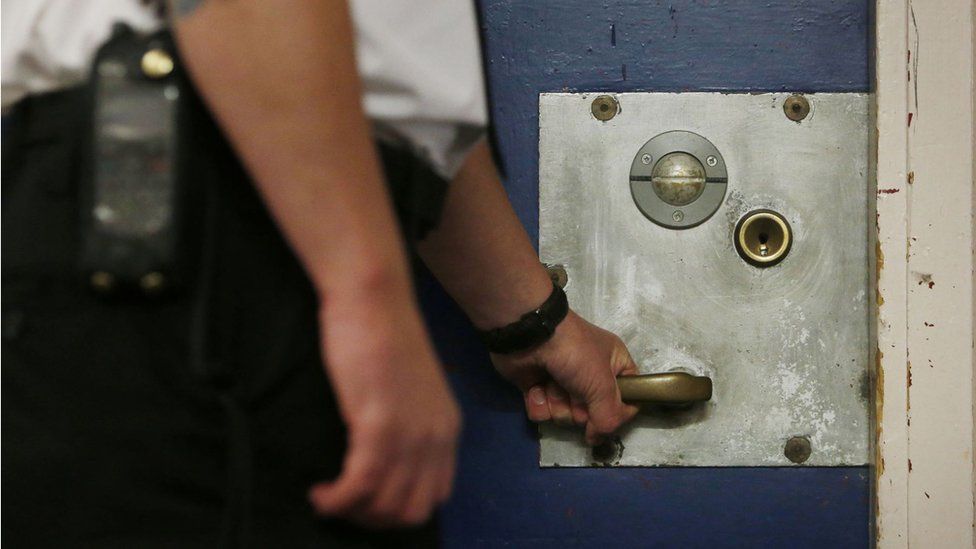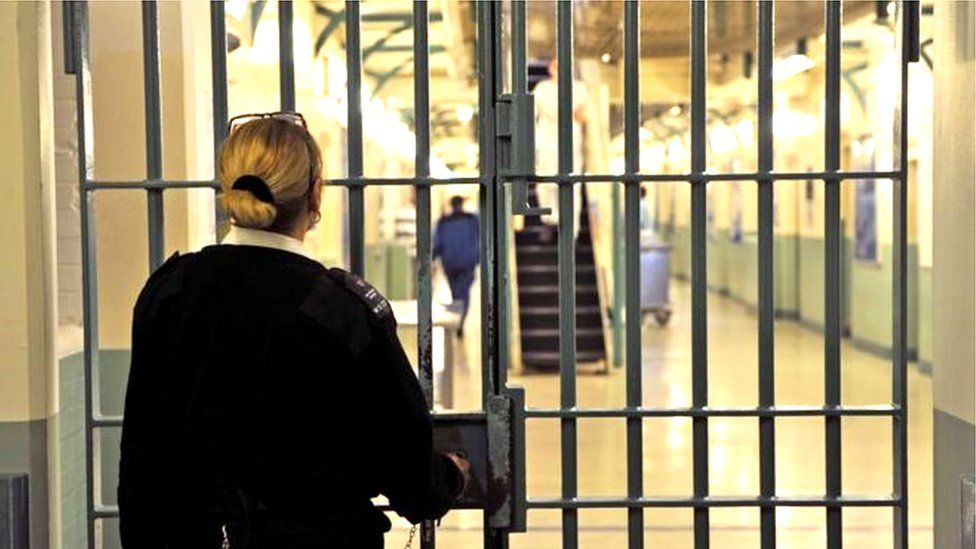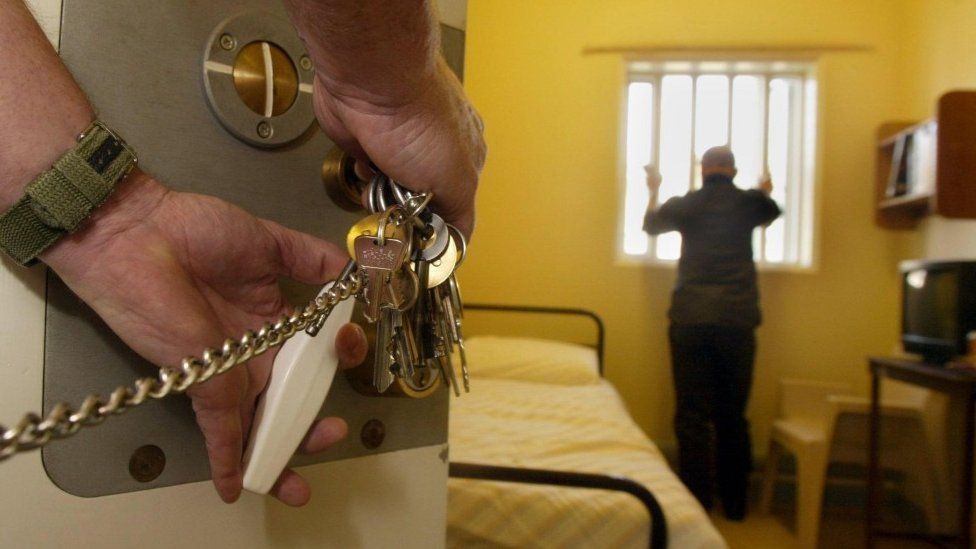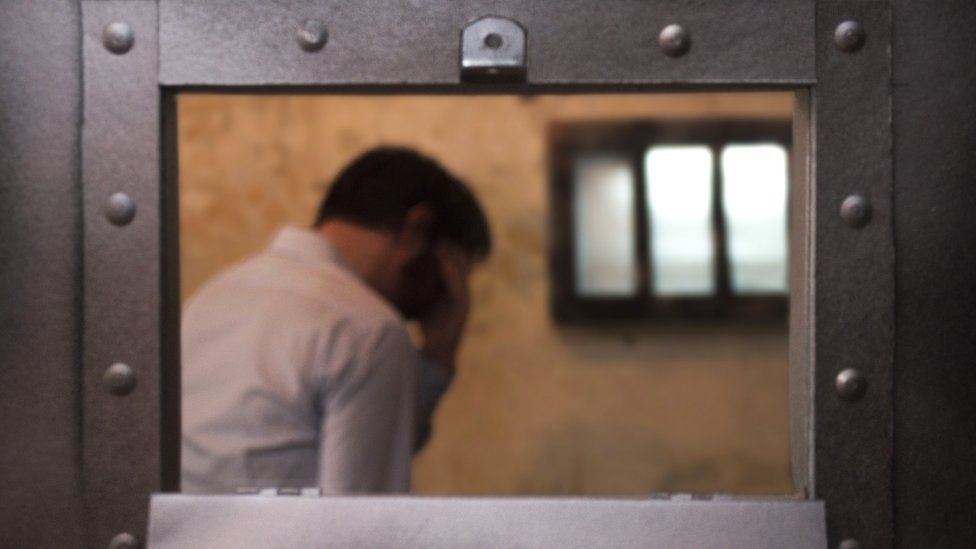 PA Media
PA MediaSerious organised crime groups took out contracts worth £2.8m for attacks on rivals in Scotland’s jails last year.
The Scottish Prison Service, which released the figures, is dealing with the consequences of a huge increase in convictions for gang-related crimes.
It said the number of prisoners linked to serious and organised crime groups (SOCGs) had doubled in six years.
An anti-corruption drive is now helping staff who are pressurised to take drugs and phones into jails.
Prison staff had their cars firebombed and six officers were charged with criminal offences last year after being influenced by criminals.
The Prison Officers Association in Scotland said the constant threat caused by the presence of so many gang members had left its members under massive pressure.
- Quarter of Scots prison population awaiting trial
- Mobiles for prisoners after visiting suspended
- Human rights concerns over prisons and police
Scottish Prison Service (SPS) intelligence reports identified 538 individuals linked to serious and organised crime, roughly 8% of Scotland’s total prison population.
Of those, 176 have been linked to 54 different SOCGs, many of whom operate throughout the UK and some globally.
The figure includes 23 “principals” who either lead SOCGs or operate at the highest level.
Fiona Cruickshanks, the head of the SPS public protection unit, said that between 2021 and 2022, more than 50 serious prisoner-on-prisoner assaults involved inmates linked to organised crime.
She said: “One of the main areas that we see is monetary contracts that are put out on people.
“That’s either individuals linked to organised crime initiating these contracts or having a contract taken out on them.
“In the last 12 months contracts that were taken out on people amounted to £2.77m, so that shows the scale of the issue and the type of individuals that we’re dealing with.”

Ms Cruickshank said the contracts were for people to be injured or killed, but none resulted in a fatality behind bars.
“We have violence over drug debts, power struggles over drug territories, violence in relation to longstanding family feuds in the community that spill over into custody as well.
“Police Scotland have been very successful in capturing these individuals and prosecutors have been successful in securing convictions, and we absolutely welcome that.
“However it does bring challenges for us.”
The violence places prison officers at risk and the service has reported an increase in threats to staff and their families.
Phil Fairlie, chairman of the Prison Officers Association (Scotland), said there had been three examples of cars being set on fire in car parks to intimidate staff.
“These people aren’t kidding,” he said. “It’s real threats that they’re issuing. They’re not bluffing.
“It means our staff are on red alert from the minute they come on shift because there’s so much going on beneath the surface. The staff are watching their backs constantly.
“It’s a high pressure, very difficult environment and they’re physically and mentally exhausted at end of their shift in some of the jails.”
Smuggled phones
Ms Cruickshank said SOCG members were constantly trying to use new technology to operate their criminal businesses inside and outside prisons.
At the start of the pandemic in 2020, prisoners in Scotland were issued with mobile phones so they could keep in touch with their families.
Calls could only be made to approved numbers, but some prisoners hacked the technology and 5,000 “misuses” of the phones have been reported.
Ms Cruickshank said smuggled smart phones remained the first choice of SOCGs but some inmates would always look for ways to beat the security on prison-issued devices.
She said the service worked closely with Police Scotland to deal with all the challenges presented by the growth in SOCG prisoners.
“We do have quite robust intelligence gathering processes and we try to take proactive action,” she said.
Scotland’s justice secretary Keith Brown said phones had helped prisoners cope with the pressure of being locked down behind bars and had had huge benefits.
He said the prison service and its staff deserved the public’s full support.
Mr Brown said: “They have to keep people apart to keep them safe and they have to stop further criminal activity within the prisons.
“They are doing a remarkable job.”
-
Quarter of Scots prison population awaiting trial
-
22 January 2021

-
-
Mobiles for prisoners after visiting suspended
-
17 April 2020

-
-
Human rights concerns over prisons and police
-
31 January 2020

-
-
Scottish prisons ‘awash’ with synthetic drugs
-
11 October 2019

-
